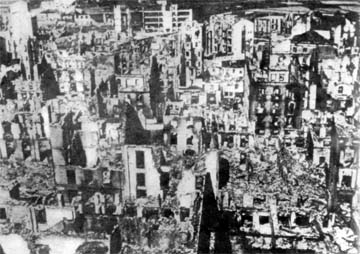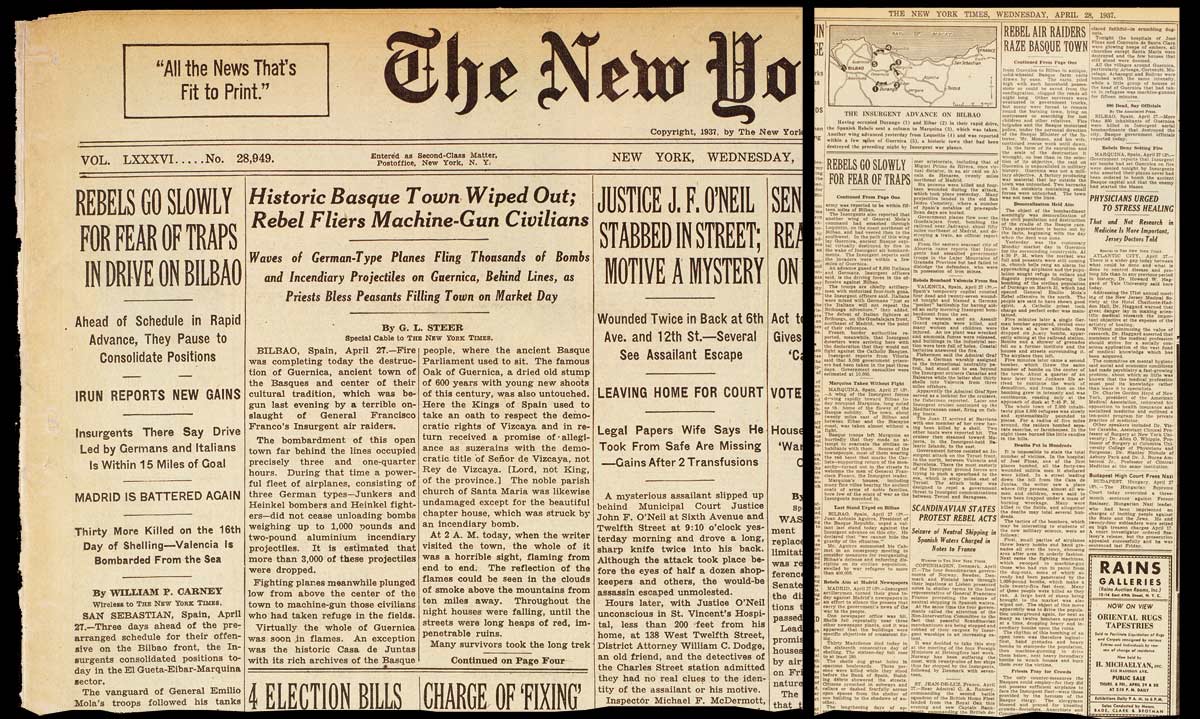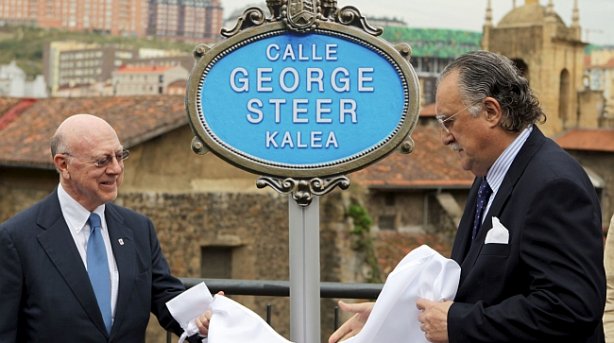Yesterday in Bilbao, finally, a street was dedicated to George L. Steer. It’s a small street, but we’re sure he’d like it, as it’s in a working class neighborhood, right next to Atxuri Station, where the trains to Guernica, Beremo, and San Sebastian leave. It also faces a park from which the mountains surrounding Bilbao can be seen. This news hasn’t made international headlines, just the local ones in Bilbao, but we wanted to join into the homage to this journalist, and we can think of no better way than sharing this most emotional chronicle, born of the terrible vision of the Basque holy city being reduced to ashes. It was that chronicle that most vividly showed the world the intrinsic evil of fascism, as it not only exposed their cruelty, but also revealed their lies.
George L. Steer was not only a truly great journalist, he was also a human who was committed to justice and the defense of lost causes which are rather often quite close to the hearts of just men. From Abyssinia, being destroyed by the Fascist Italian troops under Mussolini, to the Basque Country, being destroyed by the Fascist Spanish troops under Franco, his writings for The Times and The New York Times ruffled feathers among totalitarian leaders and their allies, whose savage and terrible acts were finally brought to light by this South African-born journalist.
We are what we do, and we are remembered for what we leave behind us. Steer was a good man whose memory will last thanks to his journalistic style that ought to be required studying for those wishing to become reporters.
When I read his book The Tree of Guernica, an Essay on Modern War a few years ago, I was proud of many things: of being Basque; of belonging to a family in which my aitite was a volunteer for the Arana Goiri Batallion fighting against Fascism, belonging to a generation of Basques who gave everything for their homeland and for freedom, and for that they either ended up dying or being jailed, persecuted, stigmatized, and exiled. I was especially proud that our first Lehendakari, Jose Antonio de Agirre y Lekube, was an honest man, filled with the strength of reason, of the energy of commitment, and the incredible moral power that being a Christian aligned with the revolutionary social doctrine of the Church gave him.
I was proud of many things and reading that book, I understood, with full clarity, that just by being the best, one can triumph even in defeat. Those men, who I was getting to know thanks to Steer’s book, made me understand that Freedom is never free, and that it can only be achieved through blood, sweat, and tears. But it is worth nothing if it is not achieved with the moral superiority granted by acting in a way that is just and respectful of human beings.
Franco won that war, and that was the only way it could have ended. The support of the other Fascist powers, and the indifference of the European “democracies” guaranteed his victory. The end of the Second World War didn’t bring us the promised freedom, and the Allies, for whom the Basques had done so much during those dark years, forgot about us. Those were trying times, made even worse because during that war, we had lost a friend: Steer had died in an accident in Burma.
That heroic generation of abertzales did, however, lay out a path for us: commitment to democracy, and the defense of human rights. Unfortunately, some allowed themselves to be seduced by the easy road of revenge and violence, and we’re still paying the price for that mistake.
Today, we Basques have the possibility to change things and become the owners of our own future. For that, all we have to do is follow the line of work and the moral principles left to us by Aguirre, Leizaola, Irujo, Landaburu, and so many anonymous Basques who kept the flame of liberty alive during those dark years.
The first chronicle refers to the bombing itself, the second to the lies of Franco. The latter also includes a communique from the House of Lords on the destruction of Guernica. We also include two chronicles from local journalists on yesterday’s events.


The Times – 1937/4/28 – Great Britain
The Tragedy Of Guernica
Guernica, the nmost ancient town of the Basques and the centre of their cultural tradition, was completely destroyedyesterday afternoon by insurgent air raiders. The bombardment of this open town far behind the lines occupied pre- cisely three hours and a quarter, during which a powerful fleet of aeroplanes consisting of three German types,(+)
The Times – 1937/4/30 – Great Britain
Guernica And After
The military situation is admitted to be very serious, but perfect order is being maintained in the town and its environs. The village of Galdacano, which lies within the city fortifications, was bombed at 4.30 p.m. to-day for half an hour by 22 bombers and six chasers.(+)
Update (May 1, 2011)
Thanks to a report on the anniversary of the bombing of Guernica that came out on the Cuban website Televisión de Camagüey, we now also have the front page of the New York Times, and the article Steer wrote telling of the bombing of Guernica.

Deia – 2010/10/9 – Euskadi
Steer street
Bilbao homenajea al corresponsal británico George Steer, el cronista del bombardeo de Gernika, y le dedica una calle en Atxuri w “Mi padre representa la memoria de los tiempos duros”, proclama su hijo (+)
El Correo Español – 2010/10/9 – Bilbao
Bilbao honra al altavoz de Gernika
Dedica una calle a George Steer, el periodista que informó al mundo del infame bombardeo de la villa foral en abril de 1937 (+)
Last Updated on Mar 20, 2020 by About Basque Country





